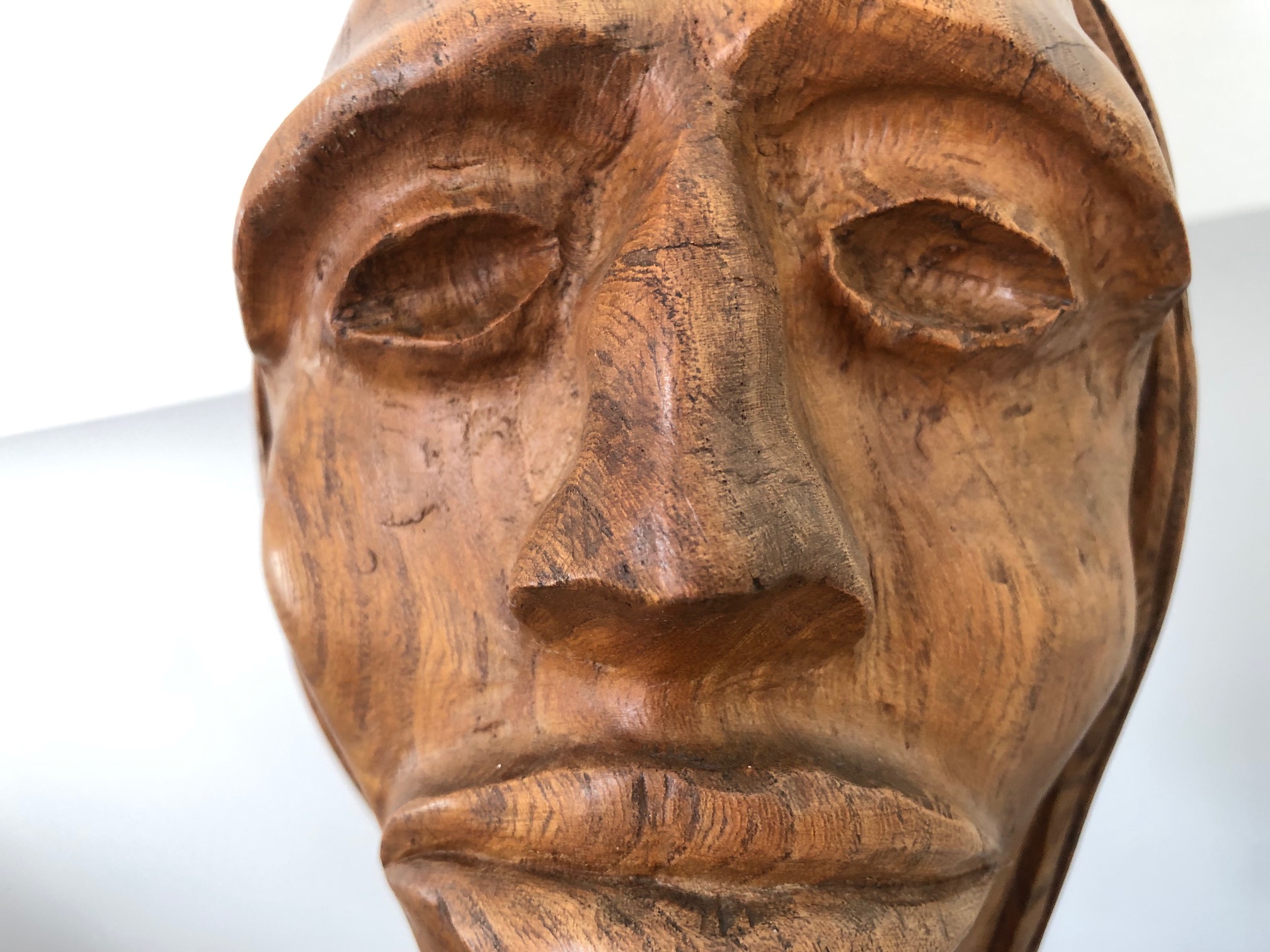It’s made out of a single piece of oak and sits upright on the window sill, though its planed rear and central hole suggest it was originally intended to hang on a wall. The head of an adult man or a woman. The face framed by stylised hair locks, long, straight and deeply incised, and curled around at the bottom to form a base. But not an entirely human head, because two horns grow from its crown. Could it be a satyr or other hybrid, half-human, half-beast? Unless – could the ‘horns’ be some kind of head-piece, the culmination of a cloak or dress?

It’s a puzzling, disturbing object. I never feel quite comfortable in its company. The expression on its face is difficult to read, and I’m not sure what the figure’s mood might be: mournful, surly, assertive, aggressive?
The head belonged to my parents. I’m sure one of them told me once how it came to be in their possession, but with a child’s carelessness I failed to remember the explanation. I’ve a vague memory that it was carved for one of them, probably my father, as a gift by an artistic friend in the 1940s, but that may be a false memory. There’s certainly no documentation about it.
I do remember where it used to be in my parents’ house in Yorkshire, on a large slab of slate on the living room floor that stood in as a fireplace. Now it sits in our house, and has done for years, mute but expressive, a strongly-modelled head that’s somehow lost its power of articulation.

Now I realise that, though I’ve plenty of memories of my father, even discounting any false ones, I have very few objects that were once his. I doubt if my brother has many, either. Apart from the sculpture, there are some of his books that I kept, thinking that I might read them in future (I haven’t), a framed portrait of Dad with a flat cap on his head, made by W. Dawson Thomson in 1945, a few photos, and not much else. I wonder if that is typical for people whose fathers died twenty-five years ago?
Sometimes friends wonder why I don’t show an interest in discovering more about my parents, and their parents, and their parent’s parents. But family history has never appealed to me much as an activity. And there’s another reason. My father, and my mother until very late in her long life, were unusually reticent about their own past. Even when prompted or bullied, they couldn’t be made to say anything much that was definite about their past lives. This was particularly true of the 1940s. That was when they first met, in London during the Second World War. Both had, in retrospect, what most people would think were interesting roles in the war. My father, a conscientious objector, worked on ambulances for the Friends’ Ambulance Unit, and my mother, who had studied German at Edinburgh University, belonged to the Wrens and worked on translating enemy naval messages. But the truth was that the war held too many painful memories – my mother’s first fiancé, a pilot, died in action, for example – which they didn’t wish to excavate, even to satisfy the curiosity of their children.

Today I can understand their reticence, even if I thought it frustrating at the time. I feel I need to honour their reluctance to resuscitate that period of their lives, when they first came together but which contained such difficult and sometimes tragic events. More generally, my father was a self-contained man who rarely gave way to strong emotion of any kind, including nostalgia. He was no loner, but he was never happier than when outside the house, on his own, digging potatoes rows or building his drystone wall (a work of many years, carried out in all weathers). I suspect he would be content now to know that I was not busily prying into his past, and that it was memories and not objects that keep him alive for me today.

Leave a Reply to Sian Cancel reply